
Józef Dowbor-Muśnicki was a Russian military officer and Polish general, serving with the Imperial Russian and then Polish armies. He was also the military commander of the Greater Poland Uprising.

Mikhail Gordeevich Drozdovsky was a Russian army general and one of the military leaders of the anti-Bolshevik White movement during the Russian Civil War. In early 1918 he led a regiment of volunteers from the Romanian Front on a march to southern Russia, where they joined the Volunteer Army of the White movement.
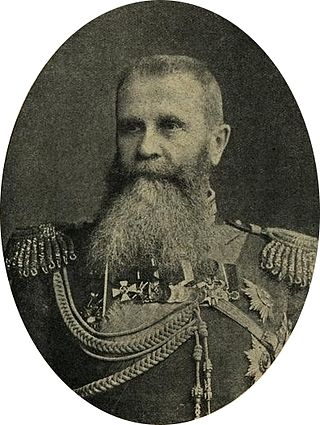
Nikolai Iudovich Ivanov was a Russian artillery general in the Imperial Russian Army. In July 1914, Ivanov was given command of four armies in the Southwestern Front against the Austro-Hungarian army, winning a major battle of Galicia. During the Russian Revolution of March 1917, Tsar Nicholas II ordered Ivanov to suppress the revolutionaries but as promised reinforcements failed to come to his aid, he canceled the aborted mission. In 1917, he retired but a year later took command of the White Army. In 1919, Ivanov died of typhus in Southern Russia.

The Byelorussian Military District was a military district of the Soviet Armed Forces. Originally formed just before World War I as the Minsk Military District out of the remnants of the Vilno Military District and the Warsaw Military District, it was headed by the Russian General Eugen Alexander Ernst Rausch von Traubenberg.

The Russian Caucasus Army of World War I was the Russian field army that fought in the Caucasus Campaign and Persian Campaign of World War I. It was renowned for inflicting heavy casualties on the opposing forces of the Ottoman Empire, particularly at the Battle of Sarikamish. It was also known for its extremely diverse ethnic composition, consisting of units from throughout the Russian Empire and both soldiers and officers from the many ethnic communities settled since the 1877-78 Russo-Turkish War in the militarily administered Kars Oblast in the Russian Transcaucasus. These included Georgians, Caucasus Greeks, and Armenians - the latter in particular strongly represented among both the soldiers and senior officers - as well as ethnic Russians and Ukrainians.

Dmitry Grigoryevich Shcherbachev was a general in the Russian Army during World War I and one of the leaders of the White Movement during the Russian Civil War.

The Southwestern Front was an army group of the Imperial Russian Army during World War I as part of the Eastern Front war theater.
The Russian Fourth Army was a World War I Russian field army that fought on the Eastern Front.
The Russian 11th Army was a World War I Russian field army that fought on the Eastern theatre of war.
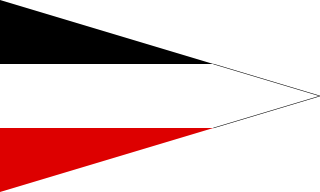
The Bavarian Cavalry Division was a unit of the Royal Bavarian Army, part of the German Army, in World War I. The division was formed on the mobilization of the German Army in August 1914. The division was disbanded in 1919, during the demobilization of the German Army after World War I. The division was raised and recruited in Bavaria.
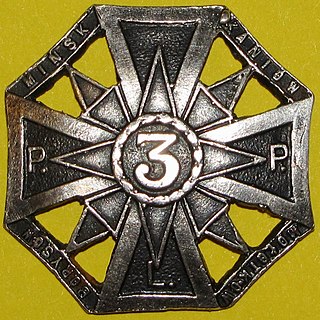
3rd Legions' Infantry Regiment was an infantry unit of Polish Legions in World War I, Polish Army and the Home Army. It existed in 1914–1939 and 1944–1945.
Machavariani Mikhail Sergeevich, Russian Imperial Army Airforce pilot, colonel
The 25th Infantry Division was an infantry formation of the Russian Imperial Army. It was a part of the 3rd Army Corps.
The 27th Infantry Division was an infantry formation of the Russian Imperial Army. It was a part of the 3rd Army Corps.
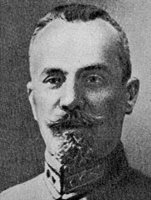
Vladimir Alexandrovich Olderogge was a Russian and Soviet military leader. He was commander of the Eastern Front of the Red Army.
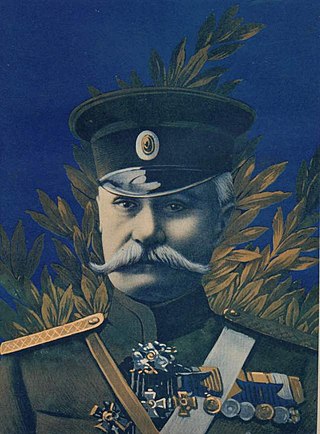
Platon Alekseevich Lechitsky was a Russian general.
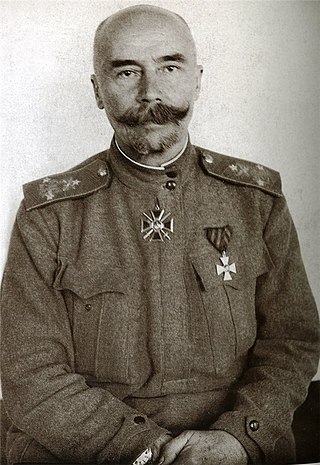
Mikhail Nikolayevich Promtov lieutenant general, artilleryman, one of the centenarians of the Imperial Russian Army, a participant in the Russo-Turkish War (1877-1878), the Russo-Japanese War, commander of the World War I and participant in the White Movement in southern Russia. Later in life, he emigrated to Yugoslavia.

The 51st Lithuanian Infantry Regiment, known as the 51st Lithuanian Infantry Regiment of His Imperial Highness Heir to the Tsarevich from 1904, was an infantry regiment that served in the Imperial Russian Army.
Osovcy is an air base of the Air Force and Air Defence Forces of the Republic of Belarus located in Byaroza, Brest Region, Belarus. Bereza (Osovcy) is 7 km NW of Byaroza. Alternate given coordinates are 52° 33.4' N 24° 52.8' E.
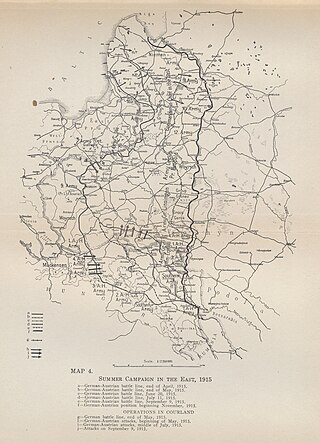
The Vistula–Bug offensive from July 13 to August 28, 1915, was a major Central Powers offensive with the decisive role of the German Imperial Army during World War I on the Eastern Front to defeat the forces of the Russian army in South Poland and Galicia.














